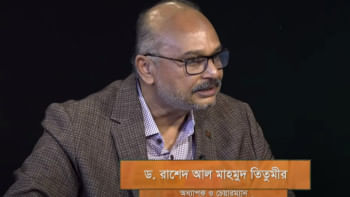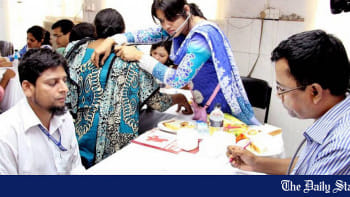High time the government got its priorities right

Over the years, we have noticed an alarming pattern of inadequate budgetary allocation for crucial sectors that prioritise people's well-being, despite repeated warnings from concerned stakeholders about the devastating impact it would have on the nation in the long run. According to a document placed in the planning commission meeting recently, the government allocated even less than what was planned in the 8th five-year plan for several sectors including health, education, agriculture and social protection. For instance, the health sector got 6.16 percent ADP allocation this fiscal year against the projection of 11.1 percent, while education got 13.38 percent against the projection of 16.5 percent.
While upper middle-income countries spend around 5-6 percent of their GDP on education, the Bangladesh government spent only 1.64 percent in 2023. The meagre allocations, coupled with inefficient implementation, have resulted in a plethora of challenges, such as outdated infrastructure, insufficient teacher training, and a lack of necessary educational resources. When the government should be providing quality education for free to all, we are witnessing widespread inequality in accessing education, with families having to bear as much as 71 percent of the expenses out of their own pockets, as per the latest Unesco Global Education Monitoring Report. The consequences are dire: a poorly educated workforce, limited opportunities for social mobility, and a compromised national intellectual capital.
The situation is much the same, if not worse, in the health sector. The midterm review report of the 8th five-year plan that was also placed at the above-mentioned meeting highlighted how the low budget for the health sector has been a "historical concern" in Bangladesh, with allocation remaining less than 1 percent of the GDP when it should have been around 3 percent. Our public healthcare system is one of the worst in the subcontinent, with scarcity of medical facilities, understaffed hospitals and insufficient medical supplies, as a result of which people spend a whopping 72 percent out of their own pockets to access proper healthcare. At a time when people are struggling to simply meet their daily needs in the midst of an unending cost-of-living crisis, how are they supposed to afford such high costs for education and healthcare? Meanwhile, instead of increasing budgetary allocation for social protection for the most vulnerable, we are appalled to see that the government has slashed it further over the years.
It is imperative for Bangladesh to reevaluate its budgetary priorities and allocate resources judiciously to sectors that underpin the well-being and progress of the nation. It must also assess why relevant ministries are consistently failing to utilise whatever little is being allocated to them. It shouldn't be lost on the government that a nation cannot simply prosper with lavish infrastructure if it has a poorly educated workforce, an unhealthy population, a struggling agricultural sector, and deep pockets of poverty.


 For all latest news, follow The Daily Star's Google News channel.
For all latest news, follow The Daily Star's Google News channel. 









Comments